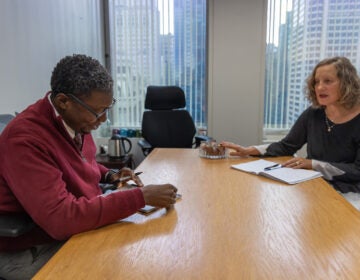Leading Philadelphia’s response to relational violence through Shared Safety
Before Women Against Abuse was founded over 40 years ago, victims of violent relationships across Philadelphia suffered in silence. Domestic violence did not have a name in those days, because it was considered a private family matter, to be resolved behind closed doors.
Gloria Steinem refers to domestic violence as “original violence,” in that the normalization of control and abuse in the home perpetuates a culture of oppression and cruelty with far-reaching implications.
When survivors were able to summon the courage to get help, they were met by first responders with no training on how to recognize the signs of abuse, nor did they know how to provide compassionate, trauma-informed care. For a survivor, the lack of awareness and support from the community made the prospect of leaving a violent relationship untenable.
In 1976, two Philadelphia hospital social workers decided it was time to take action for the women who came into their emergency room with bruises and “stories” of tripping down the stairs. They gathered volunteers to help staff a part-time hotline in the basement of a women’s center in Germantown, and thus founded Women Against Abuse overnight.
In its early years, our organization opened Philadelphia’s first domestic violence emergency shelter (beginning as a crowded, three-bed row house), as well as the region’s first transitional housing facility for families fleeing violent homes, and one of the nation’s first legal centers dedicated to victims of domestic violence.
Despite the expansion of our life-saving services, we are still turning away an astounding number of survivors trying to flee violent relationships. Of the 15,086 calls we answered in collaboration with the Philadelphia Domestic Violence Hotline in 2016, 14,644 requests for shelter were turned away because our emergency safe havens were full. And these are only the calls for help that we are aware of — there are tens of thousands of survivors who are afraid to come forward out of fear that their status as an immigrant or a member of the LGBTQ community will be used against them.
Relationship violence is a public health issue that impacts all aspects of our society. Women Against Abuse recognizes that it takes more than one organization to make lasting change. It takes a coordinated response that involves consistent training, screening and response tools to prevent relationship abuse and create safe communities for everyone.
Enter Shared Safety, a collective commitment among Philadelphia’s service providers and government representatives to making system-level changes that provide life-saving interventions and promote safer communities. From the moment we began internal discussions about the need for a much broader response to the culmination of our co-leadership for Shared Safety, Women Against Abuse has taken an active role in pioneering this important initiative, because we believe that Philadelphia will become a national model for other cities.
Fortunately, the importance of our work is being recognized by two major forces in Philadelphia. At a time when federal funding for domestic violence organizations is under threat, Mayor Kenney took the unprecedented step of appointing Philadelphia’s first Director of Domestic Violence Strategies last October. Most recently, Women Against Abuse was recognized for its leadership in pioneering Shared Safety by the Barry and Marie Lipman Family Prize at the University of Pennsylvania. This honor comes with a monetary award and access to resources at Penn and Wharton that will help guide our efforts and inspire other organizations to learn from and adopt similar initiatives.Women Against Abuse and the approximately 70 Shared Safety partners hope this collaborative approach will be replicated and implemented in cities and towns across the United States. And this sea change is already taking shape in many small ways: More states are considering laws requiring employees working in hair salons and dental practices to receive training for domestic violence screenings, since they have a prime opportunity to identify signs of abuse.
The recognition of relational violence as a public health issue is gaining momentum, and there’s no turning back. Philadelphia is poised to lead the call for safe communities through Shared Safety, but the success of our initiative depends on the support of concerned citizens like you. If protecting survivors and preventing violent relationships is important to you, let your elected officials know.
—
Jeannine L. Lisitski is the executive director and president of Women Against Abuse. The Women Against Abuse website has resources for contacting your legislator and mobilizing your community to take action.
WHYY is your source for fact-based, in-depth journalism and information. As a nonprofit organization, we rely on financial support from readers like you. Please give today.




